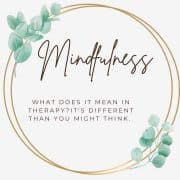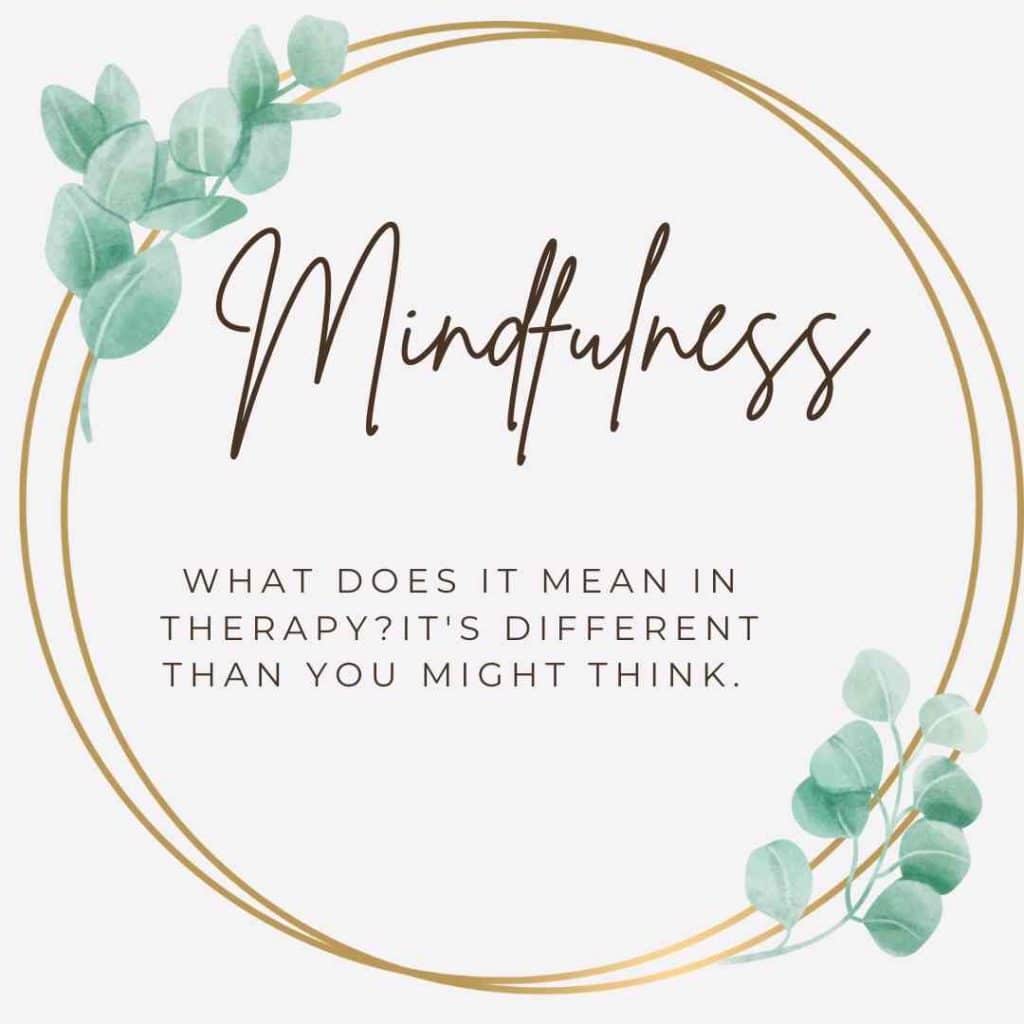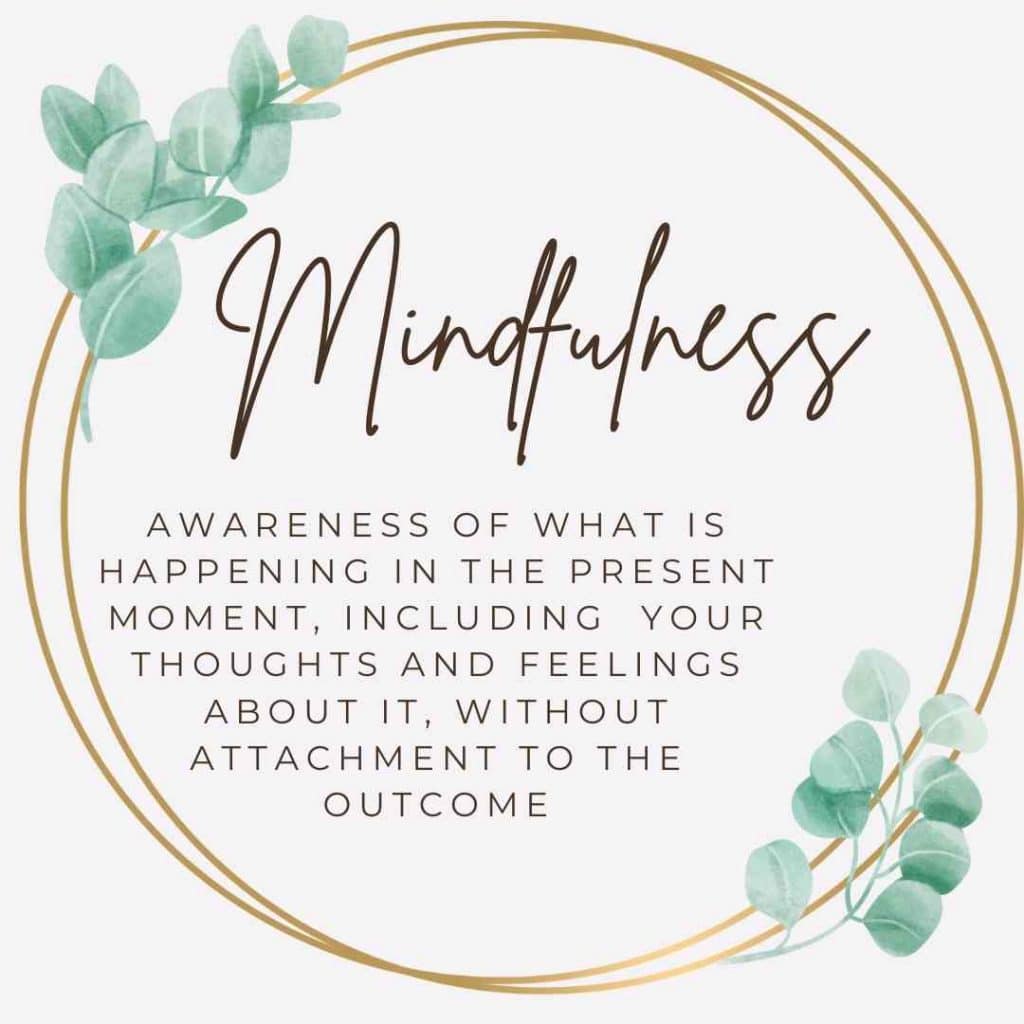

Many therapists here at the Center for Mindful Psychotherapy draw upon mindfulness practices as a part of their client work. However, what does that really mean? What is mindfulness in therapy? What will it look like to speak with a therapist who incorporates this technique? Moreover, is it the right approach for you? Mindfulness in therapy means more than you might think, complements a wide range of other therapeutic approaches, and can assist you in coping with a variety of different life challenges. Learn more to see if this feels right for you.
What Is Mindfulness?
There are many different definitions of mindfulness. It’s an age-old term that has connotations with certain religions and philosophies. It’s also a very popular self-help technique today. In between those two spectrums you’ll find many different explanations of what mindfulness is.
One great way of thinking about mindfulness is:

In other words, mindfulness is a practice of taking your focus off of the past and the future and sitting with what’s happening right now in the present moment. It’s a practice of observing the immediate situation as well as becoming aware of what you think and feel in reaction to this exact moment. It’s a practice because although the definition is fairly simple, learning how to do this isn’t easy.
Our minds love to ruminate over the past, especially when we’re dealing with periods of depression. Our minds also love to fret about the future, especially if we struggle with the symptoms of anxiety. Mindfulness helps alleviate those symptoms by continuously bringing your attention back to the present moment. And for that reason, it’s a helpful technique for all different types of therapy.
What Is Mindfulness in Therapy?
When you think about going to speak with a therapist, do you imagine discussing all of your unresolved past conflicts as well as all of your concerns about the future? If so, does that mean that mindfulness in therapy isn’t right for you? Not at all. There are many, many different approaches to therapy. Some are grounded more in the present moment while others are more past and/or future-oriented. However, most therapeutic approaches include aspects of past, present, and future.
Is Mindfulness a Type of Therapy?
In most cases, mindfulness is a foundation that informs the therapist’s approach to working with you, rather than a specific type of therapy. Additionally, there are types of mindfulness techniques that therapists might use to assist you through various aspects of many different types of therapy.

Photo by madison lavern on Unsplash
That said, there are specific mindfulness therapy types, as well. For example, therapists John Teasdale, Zindek Seagal, and Mark Williams helped create an approach called Mindfulness-Based Cognitive Therapy (MCBT) which brings a mindfulness aspect to a traditional CBT approach. Jon Kabat-Zinn is well-known for Mindfulness Based Stress Reduction techniques (MBSR). So, if you’re all about mindfulness and think that this approach could be perfect for you then look for a therapist who has education and experience in mindfulness-based therapy.
On the other hand, if you aren’t certain whether or not mindfulness is for you, don’t let the word deter you from working with therapists who include it in their treatment descriptions. It doesn’t mean that you’ll sit there focusing on mindfulness in every session.
How Does Mindfulness Help in Therapy?
For the most part, mindfulness is a technique that helps support everything else that you do in therapy. Let’s face it, therapy is hard work. It can be amazing, joyful, inspiring work that’s filled with growth and pride. But doing the work is hard. That’s why you have a professional there helping you along the way. Mindfulness techniques help bring you back to a settled, calm realization that everything is actually okay in this very moment. That provides you with a foundation of strength from which to grow.
Mindfulness in Trauma-Informed Therapy
There are many different approaches to working through trauma. Some involve talking about the traumatic experiences and others do not. However, all of them tend to have some aspect of mindfulness to them even if you never hear the therapist explain it in those terms.
In order to be able to address and cope with trauma, whether somatically or through talk therapy, you need to have solid grounding in the present moment. This is especially true if you struggle with symptoms such as flashbacks. Therefore, you need to learn the skills for grounding yourself in the present moment. If you’ve ever had a therapist work with you on settling in to your body and learning to uncover what’s happening there in this moment, then you’ve actually already practiced mindfulness in therapy.

Photo by Marionel Luciano on Unsplash
Mindfulness in Treatment for Anxiety
What is anxiety? More than anything else it’s worry about the future. This could be the immediate future (for example, in social anxiety the steps leading up to walking in to a party can be terrifying). Alternatively, this might be a long-term or even abstract future. Regardless, anxiety is not rooted in this exact present moment, in which you are breathing and sitting and on some level, even if it doesn’t feel like it, are okay. By learning how to tap into the present moment, you can relieve much anxiety.
For example, have you ever tried the 5-4-3-2-1 senses exercise to relieve anxiety? When you feel anxiety coming on, pause. Identify five things that you can see in your current environment. Now find four things that you can touch. How about three things that you can hear, two that you can smell, and one that you can taste. Often this simple practice brings down your anxiety levels significantly. And, you might notice, it’s all about noticing what’s happening with your senses in the present moment, which is, as you’ve learned, what mindfulness in therapy is all about.
Some Thoughts From Our Clinicians About Mindfulness
As you can see, mindfulness can inform all different types of therapeutic treatment approaches. Every individual is different, therefore every individual benefits from different approaches. Mindfulness works well with so many of them. Here are some different ways that our therapists have discussed therapy in their bios on our therapist directory:
- Christian Heinitz shares, “I utilize wisdom from Eastern and Western psychology as well as the body, often incorporating mindfulness, parts work, dreams, and play.”
- Stephanie Bain says, “I am also informed by mindfulness, meditation, shadow work, dreamwork, and yogic practices.”
- Colleen Haddock writes, “My work is grounded in a collaboration of relational, mindfulness, client centered, transpersonal, and somatically informed psychotherapy theories.”
- Greg Kirnos Boccieri shares, “As an associate marriage and family therapist with extensive training in trauma-informed body and mindfulness-based psychotherapies, I’ve learned how to help nurture inner wishes and desires in a safe and embodied way.”
- Odessa Avianna Perez says, “I specialize in Somatic Psychotherapy, with a focus on mindfulness, attachment, nervous system regulation, and dance and movement therapy. I am trauma-informed, and consistently incorporate social and racial justice lenses.”
So, again, you can see that mindfulness shows up in therapy in many different ways and forms. Find what’s right for you! If you’re ready to figure out how that best works for you, contact us for an initial consultation.
Read More About Mindfulness:
You might also want to check out:




8 thoughts on “What Is Mindfulness in Therapy? It’s More Than You Think!”
Comments are closed.